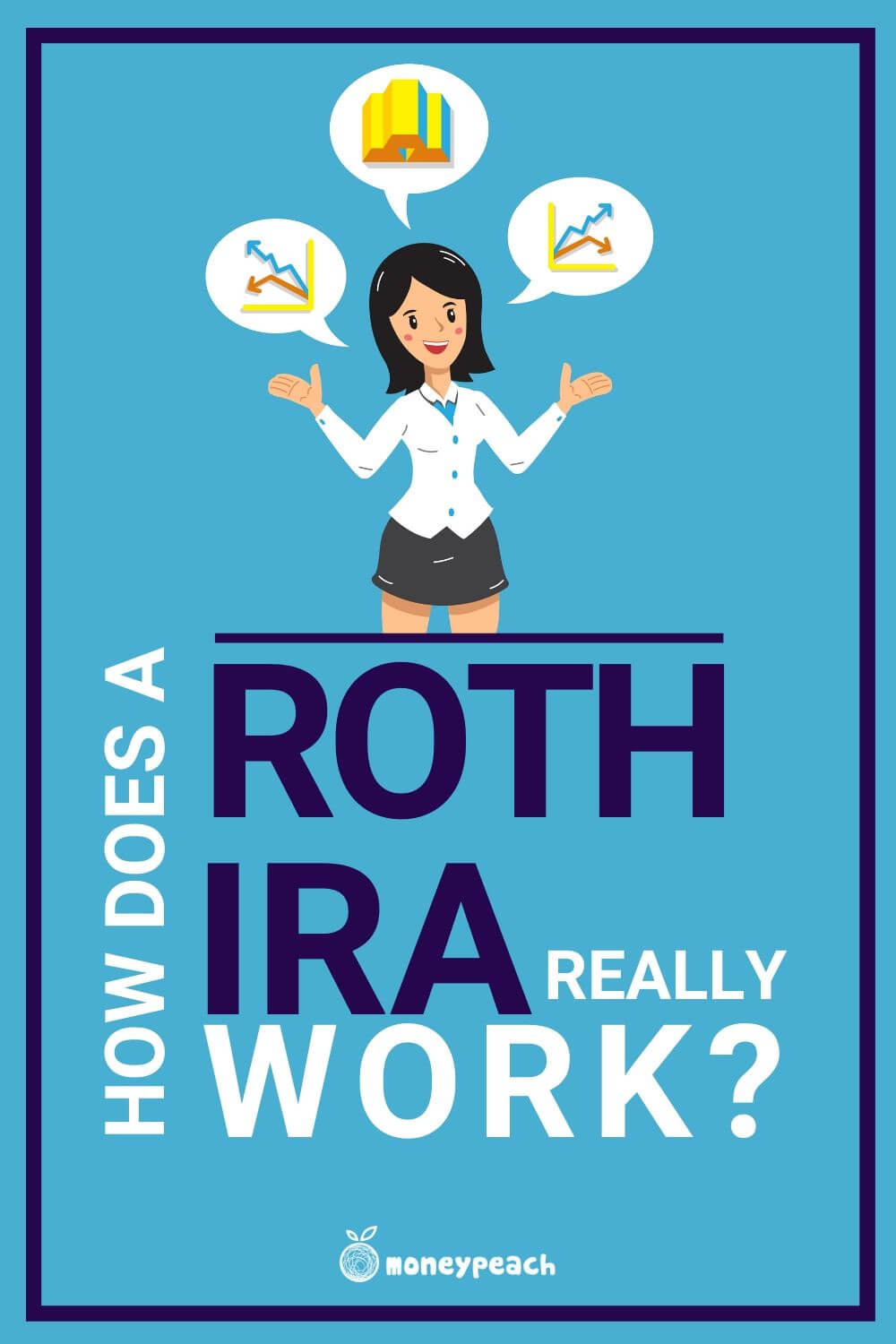Contents For This Post (Click to Open)
Recently I opened this email from a reader:
Hi Peach,
I need advice on a 401(k) that my husband rolled over to a ROTH IRA. He rolled it over almost 2 years ago and it hasn’t grown, but cents. Unfortunately, we haven’t contributed to it, but really want to start doing that. I just want to make sure that the ROTH IRA is the direction to go with a retirement account. Seems like it should have grown a little, even without us contributing to it. School me…I’m lost!
Thank-you,
Brandi
Before I jump into a ROTH IRA, it would be best if we understand how and why retirement investing works.
A 401(k), 403(b), 457, IRA, ROTH IRA, and a SEP IRA are all a bunch of confusing numbers and letters smashed against each other in an effort to confuse and eventually scare the crap out people when it comes to investing for retirement.
Well, maybe that is a stretch. Truthfully, the numbers and letters are simply where they are located inside the Federal Tax Code.
Example: The rules for a 401(k) are found inside the IRS’s tax code – Section 401 subsection K.
Why We Have Retirement Accounts?
Retirement accounts are a benefit for you and I because it creates a way for us to avoid sending even more money to the government in the form of taxes. Thus, you may have heard retirement accounts referred to as tax sheltered accounts because that’s exactly what they do; they shelter your money from the IRS.
How Do We Avoid Paying Taxes on This Money?
When we save outside of a tax-sheltered account, we are taxed on the money before we ever invest it in the form of income tax. Then when we invest and our money grows, we pay a 15% (20% for high income earners) tax called capital gains tax whenever we sell the investment. However, when you invest inside a retirement account, you avoid this tax in a few different ways 🙂
Pre-Tax Retirement Investing
Pre-tax simply means the money you invest into your retirement account is not (yet) taxed. Instead, the money you send to your 401(k), 403(b), 457, is taken from your paycheck before the money is ever taxed . In addition to the pre-tax, the money inside your account grows tax-free over time. The only time you pay taxes on a pre-tax account is when you withdraw the money in retirement (age 59 1/2 ). As of right now, the amount of money you withdraw at retirement is taxed as ordinary income.
Note** If you don’t work for an employer who offers a 401(k) plan OR you are self-employed, you can still take advantage of this pre-tax retirement investing. Instead of the money coming out of your paycheck pre-tax you would simply deduct the amount you invested throughout the year when you file your taxes in the Spring. This type of account is called a traditional IRA (Individual Retirement Arrangement).
 What About the ROTH IRA?
What About the ROTH IRA?
In 1997, William Roth, a U.S. Senator from Delaware, helped put the ROTH IRA into law. Remember this man’s name, because he is going to help you build a boat load of tax-free wealth over time!
The ROTH IRA is different than all other retirement accounts because instead of investing your pre-tax dollars, you are instead investing after-tax dollars.
Just like the pre-tax accounts, the money still grows inside tax-free, meaning you no longer pay capital gains tax. However, in retirement you can withdraw the money WITHOUT PAYING TAXES!
Example: You get paid on Friday. Saturday morning you go online and send your AFTER-TAX dollars into the ROTH IRA. Over time the money grows inside the ROTH IRA via stocks, bonds, mutual funds, certificate of deposits, etc., and when you withdraw the money, you don’t pay taxes.
Why Does the Government Give Me a Tax Break?
Great question! When you are investing into retirement accounts, you usually will have to wait until you are age 59 ½ before you can withdraw the money. If you do so before this age, you will pay taxes on this money AND a 10% early withdrawal penalty.
My Opinion: The only reason to pay the penalty would be to avoid a bankruptcy. Otherwise, leave the money alone! The more money you have in there, the more your money will go to work for you to build substantial wealth. As soon as you withdraw a portion of the investment, you would pay a penalty AND your money stops working for you.
Since the government can count on your money being left alone until you are of age (or they can count on your 10% penalty), in return they give you a nice little tax break.
The ROTH IRA Rules
Here’s exactly how a ROTH IRA works.
How Much Can I Invest Into It?
$6,000/year per person in 2020 with an additional $1,000/year if you are age 50 or older.
After-Tax or Pre-Tax Dollars?
After-tax dollars only.
Income Limitations?
Yes.
In 2020 single filers begin to phase out at $124,000 and then are ineligible for a ROTH IRA at $139,000.
In 2020 married filers begin to phase out at $196,000 and then are ineligible for a ROTH IRA at $206,000.
**Note: If you are outside the income limitations for a ROTH, you can back door your way into a ROTH IRA by converting a Traditional IRA to a ROTH IRA after paying taxes on it. I highly recommend this, but please contact your tax professional before you get started.
When Can You Invest Into a ROTH IRA?
You can invest all the way up until April 15th, 2021 for the 2020 tax year.
Do I Have to Have an Income?
Yes and No.
You must have an earned income to invest money into a ROTH IRA, and if your income is below the contribution limits, then you can only invest up to what you earned within the year. This means if you earned $4,000 in 2020, you would only be able to invest $4,000 instead of the $6,000 contribution limit.
**HOWEVER, A NON-WORKING SPOUSE CAN ALSO OPEN A ROTH IRA.
First off, let me rephrase this by stating there is no such thing as a non-working spouse. I have been home with my kids a few too many times when my wife is at work and it is way more work than actually going to work.
These types of ROTH IRAs are also referred to as Spousal IRAs, and the same rules apply. This means together, you and your spouse can invest up to $12,000 per year ($14,000 age 50 or older), even if only one of you have an earned income.
Can I Contribute If I Have a Retirement Account at Work?
Yes.
What About Mandatory Withdrawals at Age 70 ½ ?
No.
The government cannot collect taxes when you cash out on your ROTH IRA, so they don’t force you to withdraw from it when you are age 70 ½.
This is one of the BEST things about a ROTH IRA and is one of the main differences from pre-tax retirement accounts where you are forced to withdraw your money (so the government can start to collect taxes on that money).
What If I Don’t Need the Money Inside my ROTH IRA?
If you don’t need the money from a ROTH IRA, you can leave your tax-free money inside the ROTH for as long as you live. You can also leave your ROTH IRA to a beneficiary, and they can stretch this tax-free money over their lifetime. This is a fantastic bonus for future generations.
When and How Can I Withdraw From the ROTH IRA?
If you are OVER age 59 ½ , you can withdraw as much as you would like, tax-free, so long as your ROTH IRA has been open for at least 5 years.
Example: If you opened your ROTH at age 60, you wouldn’t be able to withdraw from it until age 65, or you would pay a 10% penalty.
If you are UNDER age 59 ½ , you can only withdraw the amount you have contributed (not the growth portion) without paying a penalty.
BONUS: If you have had the ROTH open for at least 5 years, you can withdraw from the account penalty-free (but not tax-free) for the following expenses:
- First time home purchase up to $10,000 per account for you, your children, or your grandchildren.
- For College expenses for you, your children, or your grandchildren. This can be a little tricky and you should contact your tax professional before starting this process. A 529 Plan is a much better option for this.
Back to the Brandi’s Email
Here is the answer to Brandi’s question:
Hi Brandi,
Your ROTH IRA is not actually the investment. It is the tax-advantaged bucket that holds your investment inside it to protect your money from taxes. If your ROTH IRA is performing badly, which it sounds like it definitely is, your ROTH IRA is not to blame. Instead, you should be looking at what is INSIDE your ROTH IRA.
Thanks for the question,
-Chris Petrie
In a Nutshell…
For those of you who skipped to the bottom (you should really go back to the top), here is the ROTH IRA breakdown:
- After-tax contributions up to $6,000/year per person ($7,000 if over age 50) in 2020
- Tax-free growth for the investment inside the ROTH IRA
- Tax-free withdrawals at age 59 ½ (or for qualified withdrawals – see above)
Where Can I Open My ROTH IRA?
You can really open a ROTH IRA anywhere. Almost all investment companies, banks, and financial advisors offer ROTH IRA accounts.
Here are the questions I would be asking:
- Is there a fee to open the ROTH IRA?
- What are the annual expenses for the ROTH IRA?
- What can I invest inside the ROTH (mutual funds, ETFs, managed funds, etc.)?
- What are the fees for buying/selling inside the ROTH?
- Is this a DIY account or will and advisor be helping me?
**I currently have my ROTH IRA at Ally Invest.
Ally Invest
Ally Invest is my first choice when it comes to opening a ROTH IRA and it’s also where we have our own accounts. Here’s why I recommend Ally Invest:
- Low Fees: 0.00% – 0.30% is the lowest you will find for the quality you receive.
- Large Investment Selection: Many different investment portfolios to choose from based on your risk tolerance
- Integration to online savings accounts: We also have our Sinking Funds set up with Ally Bank.
Personal Capital
Fees are a little higher than Ally Invest, but they are still lower than 95% of investment brokerages you will find. Fees are higher because you will have your own human advisor to help you get started. You can also try their free app which allows you to see all of your account in one place in real time. I use personally use this tool to track my own net worth in real time. You can open an account at Personal Capital here.
Did you know rich people focus on their net worth while poor people focus on their working income? I highly recommend everyone start tracking their net worth. When I started – it was a negative net worth! With that said, what gets measured, gets managed. Start tracking your net worth right away — don’t worry, it’s very simple.
I am an affiliate with the investment brokers listed above. If you do open an account with either of them, they will be sending me a thank-you referral commission at no extra cost to you whatsoever. If this doesn’t sit well with you, simply close out your browser and go directly to their landing page from a new browser. The thank-you commissions I receive allow me to continue to provide you free content on this blog, podcast, and YouTube channel. Thank-you for your support!
Open Up Your ROTH IRA Now
You’ve read this far through the post and you’re ready to open up your first ROTH IRA. Your best bet is going to be with Ally Invest where you open up an account with $100 minimum deposit and start growing your nest egg from there. If at all possible, set up automatic recurring deposits into your ROTH IRA. Don’t forget, you can invest up to $6,000 per year ($500 per month or $115 per week).
If you’re age 50 or older in 2020, then you can add an additional $1,000 per year.
Good luck!







6 Comments
I’m having a hard time deciding between Betterment and Vanguard (DIY, not the robot advisor feature). My employer got bought out and I either need to rollover my retirement fund or keep it there. Seems like the best idea would be to roll it over to my new employer so I can get the growth benefit. But I’m not sure (the investing options are very weak in my opinion). The other options would be Betterment (which I already have small Roth IRA that I started earlier in the year) or opening a Vanguard account. Any thoughts?
Hi Oscar,
Great question and I really don’t think you can go wrong either way. Vanguard is slightly more expensive than Betterment if you’re account is $10,000 or more, because as you grow past $10k, Betterment’s fees become the lowest you will find anywhere.
Vanguard does have a better human adviser component to it, but if you are looking for a full robo-investing approach, then I would go with Betterment.
In reality, no one has a crystal ball to predict the future, but if you’re asking my opinion, I like them both 🙂 However, I will say I DO invest with Betterment and I do not invest with Vanguard. I hope this helps you make the decision that is best for you!
Thanks for asking!
This was a really well-written article and extremely informative! Thanks for sharing with everyone the 411 on opening a Roth IRA!
Thanks for reading Centsai! I appreciate the feedback 🙂
I’ve heard great things about Ally Bank. High APY savings account and trustworthy. They are also a good stock to watch. Keep up the informative content, love it!
-The Blogging Zoomer
https://bmoblogs.com/
You’re spot on! I am also a huge fan of Ally Bank (Ally Invest) for investing purposes. I have multiple accounts in both the savings and investments.